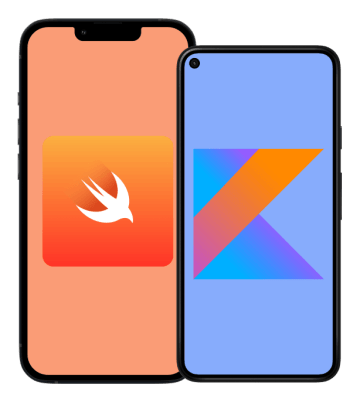Native vs multi-platform app development
...which way to go?
Native development
If we mention native development, we mean that one creates an app for each platform separately, using native tools provided by the OS producer. This means that if you are aiming for more platforms, it is thus necessary to create an app for each of them. For example when a mobile app is programmed, there has to be two versions - one for Android and second for apple devices with iOS system. It seems like that all the work has to be done twice. But it does not have to! App development consists of several works such as programming itself and much more other work. These are works like UI/UX design, API and app backend. These aspects are almost identical for both apps, so there is no need to create for each platform separately.
It is not applicable for the app itself. Each platform uses a different programming language - iOS (Swift), Android (Kotlin). There is no other option than creating this part for each platform separately. It is followed by bigger time consumption and related costs of the final app.
These are native languages, which means they are significantly complex. They provide almost infinite options to a programmer. Which actually brings both advantages and disadvantages.
The biggest advantage is their optimization and thereby performance of the final app. Another advantage and a weakness at the same time is its complexity. In order to be a developer able to fully work with them, it is necessary for him to spend a lot of time using them in his practice. The best option is the developer has years of experience using the specific language. It is very difficult to master both mentioned languages at the same time by one developer. Developers are thus often specializing themselves only in one language and one of these platforms.
Advantages:
-
Optimization and performance
-
Immediate access to the newest OS functions
-
Easier connection to wearables
Disadvantages:
-
It is necessary to have two experienced development teams
-
More complex testing
-
Longer development and its higher price
-
High language complexity
Suitable application:
Native development is mostly suitable for apps with a high number of animations or if the customer needs to implement support for a specific hardware - such as Apple Pencil.

Multi-platform development
As the multi-platform name suggests, we can aim for more platforms at the same time through one code. Multi-platform development can be significantly more efficient and cost effective than native development.
Significant part of a code can be used for both platforms thanks to multi-platform tools. In some cases, it can be up to 80-90% of the code. Of course final development parts have to be done for each platform separately, but it is the minor part - around 10 - 20%. If you need to develop app really fast, and thereby gain an edge over the competition, multi-platform development might be the right way for you. If a multi-platform app is correctly created, it is for ordinary users almost indistinguishable from an app made natively.
It is important to mention that multi-platform tools have their disadvantages as well. One of these is a risk related to relying on packages and libraries made by third parties. Not all functionalities and features are implemented in its basics.
At ASN Plus, we use multi-platform development quite often. We like one framework a lot due to its simplicity. We have good experiences with it as well. It is a Flutter framework. If you are interested in what we use Flutter at ASN Plus, we wrote about it before in our blog and you can also learn about developing applications using the Flutter framework.
Advantages:
-
Shorter development time and lower price
-
Only one developers team
-
One code for both platforms
-
Faster bug fixing (One source code)
Disadvantages:
-
Some platforms are not supported
-
Need of relying to third party packages
Suitable application:
Multi-platform development is suitable for form apps or ones with simpler graphics. On the other hand, there is almost no such app which cannot be created by multi-platform development. But in some situations it is better to choose the native development.

Summary
It is not possible to state that native development is the only right way. It is not possible to state that the multi-platform development will replace native development in future as well. We can assume that both ways will be widely used in future for app development. There will probably still be an option to choose for various solutions the correct development tool in future.
In native development it is necessary to count on longer time and higher development costs. For most apps which we meet in our practice, it is a better choice to use multi-platform development, because it does not mean a big financial burden and the final app can be finished earlier. For example BMW corporation has chosen to go in the multi-platform way of development and they created this way their own app My BMW in Flutter.
Are you thinking of mobile or other app development? Do not hesitate to contact us. Our developers team will be happy to attend to you and help you to create your app. We will help you from design to final app distribution.